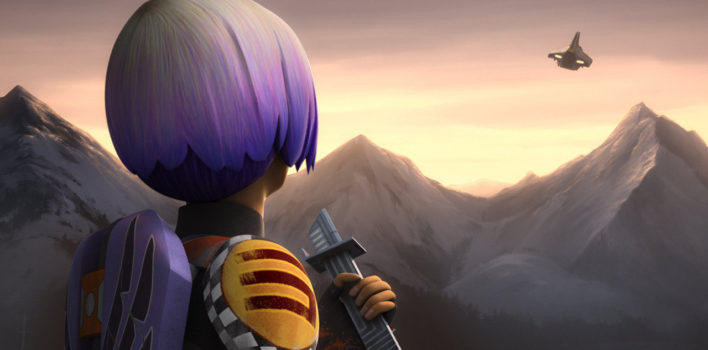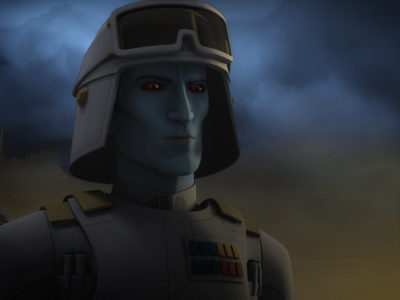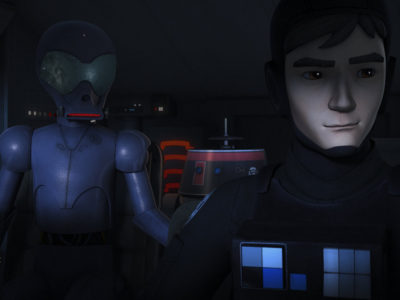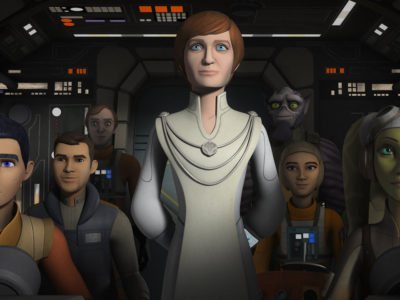Star Wars Rebels S03E16 Legacy of Mandalore
Star Wars is a cinematic icon, but it is much more than its movies. Blaine and Josh dive deep into the universe of Star Wars Rebels, the fantastic animated show on Disney XD, with reviews of the third season of this exciting series. As a show aimed at kids, but also clearly for the kid in every adult Star Wars fan, they’ll also have a discussion section to talk about the themes covered in each episode.
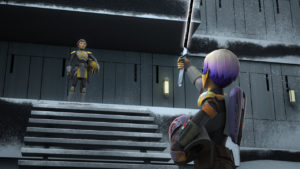 In Legacy of Mandalore, Chopper, Fenn Rau, Kanan, Ezra, and Sabine head to Krownest, a small, snowy planet in the Mandalore sector, in hopes that they might recruit Sabine’s clan to their cause. They’re greeted by blaster and rocket fire from clan Wren (It appears Sabine’s family isn’t much for small talk.), and the Phantom’s main thruster is quickly disabled, forcing the crew to make a crash landing. On the ground, Sabine is surrounded by her brother Tristan and a cadre of clan members and escorted to the Wren stronghold, where she comes face-to-face with her mother, Ursa.
In Legacy of Mandalore, Chopper, Fenn Rau, Kanan, Ezra, and Sabine head to Krownest, a small, snowy planet in the Mandalore sector, in hopes that they might recruit Sabine’s clan to their cause. They’re greeted by blaster and rocket fire from clan Wren (It appears Sabine’s family isn’t much for small talk.), and the Phantom’s main thruster is quickly disabled, forcing the crew to make a crash landing. On the ground, Sabine is surrounded by her brother Tristan and a cadre of clan members and escorted to the Wren stronghold, where she comes face-to-face with her mother, Ursa.
In spite of her daughter’s most persuasive efforts, Ursa shows no interest in joining a rebellion movement, even going so far as to say that Sabine has no claim on the darksaber. Mandalore, Ursa explains, is fractured, with Gar Saxon—now Governor of Mandalore—having thrown his lot in with the Empire; and Sabine’s father is held captive by Saxon in order to subjugate clan Wren. But Sabine is determined and bold: Mandalore “needs a strong leader, but you have to trust me,” Sabine says. Ursa feigns acquiescence, yet as soon as her daughter is otherwise occupied, she informs Gar Saxon of Rebel presence and takes Ezra and Kanan hostage.
Tensions erupt as Saxon and his squad arrive on Krownest and confront the Ghost crew. Ever the consummate politician, the Governor of Mandalore sees this as a perfect opportunity to put and end to the troublesome clan Wren once and for all. Chaos ensues as the Wrens and Rebels unite to fight agains Gar Saxon and his Imperial-sympathizing lot, and in an epic showdown, Sabine and Saxon square off, with the former wielding Ezra’s lightsaber and the latter wielding the darksaber. Her training with Kanan pays off, as Sabine is able to disarm Gar Saxon. But in an act of mercy, she refuses to kill him. As she turns her back on the defeated Governor, he withdraws a concealed blaster and takes aim at Sabine. A shot rings out, and Saxon falls to the ground, having been dealt a deadly bolt courtesy of the nearby Ursa.
The death of Gar Saxon is a major loss for the Empire’s quest to maintain control of Mandalore, but the battle is far from over. And Sabine knows it. As the Ghost crew prepares to leave, Sabine informs them that she is “done running” and is ready to stay and stand with and for her people. She watches with fondness as the the Phantom, carrying her friends (her second family), flies into space.
_____________
Well, the creative team is pulling out all the emotional stops lately, and I suspect that will only continue with next week’s Through Imperial Eyes. One 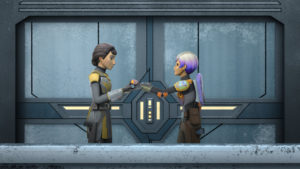 thing is certain, however: Legacy of Mandalore is a game-changer for the Ghost crew, who have—at least for the time being—left behind a beloved member of their team and family. I would be remiss should I fail to use this episode as an opportunity to reflect on what Sabine has meant to both her fellow rebels and fans, but first, I think had better speak to some of the broader ramifications this episode holds for Mandalore.
thing is certain, however: Legacy of Mandalore is a game-changer for the Ghost crew, who have—at least for the time being—left behind a beloved member of their team and family. I would be remiss should I fail to use this episode as an opportunity to reflect on what Sabine has meant to both her fellow rebels and fans, but first, I think had better speak to some of the broader ramifications this episode holds for Mandalore.
Piece by piece, we’re starting to learn more about what happened to Mandalore after the Clone Wars. In short, this episode reaffirms the fact that the post-Republic Mandalore is fractured and plagued by political and social turmoil. Clan Wren ostensibly desires freedom for their country and people, but they are fighting against seemingly insurmountable odds. Gar Saxon’s alliance with Palpatine has helped keep Mandalore under the iron-fisted grip of the Empire, and so Ursa’s willingness to turn over Sabine and her friends is an action driven less by personal vendetta and more by desperate political calculation. In other words, Ursa clearly holds her political ideals more highly than she does her own family, and Sabine isn’t shy to call her out about the fact.
This character-centered depiction of the complicated and fraught nature of Mandalorian culture causes this episode to close to home in an interesting way. At its heart, Legacy of Mandalore is quite literally about the harsh realities of living in a fallen and broken world (or planetary system, as it were). And without drawing any direct parallels to the current state of politics and social unrest (We get enough of that on the news.), I think it’s clear that many Americans can identify with the struggles of both Ursa and Sabine to a certain extent. We agree that things are not as they ought to be, but we are sharply divided in terms of finding a means and method of finding and implementing a solution.
For Mandalore, however, ultimate hope can’t be found solely though political action or even by reclaiming a warrior heritage. (Sabine’s refusal to kill Saxon is a testament to the limited efficacy of the latter approach.) Instead, Mandalore—as Sabine points out—will heal and flourish only when they find a strong leader. And it is precisely at this point that Legacy of Mandalore echoes the eschatological hope found in the Christian narrative, where Christ, who rescued His people from bondage, will return to make the earth and heavens new and heal our brokenness. When all is said and done, even Ursa begins to buy into the kind of redemption narrative proffered by Sabine, as she willfully rejects Mandalorian battle code to save her daughter from certain death at the hands of Gar Saxon. Mother and daughter are united, and now the search for the true leader of Mandalore begins.
In the end, it makes perfect sense for Sabine to stay behind and help her people. But that doesn’t mean she’ll be missed any less by the Ghost crew and scores of Rebels fans. It is incredibly fitting that Sabine was a munitions expert, for she brought an energy and vivaciousness to the show that will be sorely missed and deeply felt. Moreover, she was never afraid to stand alone as the voice of reason when tensions ran high, and her colorful drawings and illustrations made the Ghost and the Phantom a more homey, warm, and welcoming environment. In spite of her impending—and hopefully temporary—absence, her vibrant artwork will stay with the Ghost Crew wherever they go, enriching their lives as they look upon it and think of her. And isn’t that, after all, just a microcosm of what Star Wars: Rebels does for us all?
REBELS DEBRIEF
Star Wars Rebels is a family show. Parents love watching as much as their kids. Infusing the spiritual with the fantastic and adventurous, Rebels continues the spirit of what makes Star Wars great. In order to foster the young minds and hearts of your Reel World Theologians, each week there are questions you can use during or after the show to talk about with your kids. Enjoy the show and then enjoy conversation, but always remember that story is powerful and Star Wars Rebels is not mindless.
- Why does Ursa betray Sabine?
- How do you think Sabine feels leaving her friends behind?
REBELS TRIVIA
- This is the first on-screen appearance of Krownest.
- The creative team says that the design Wren stronghold is influenced by Frank Lloyd Wright.


